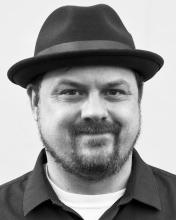Graham Pruss is a National Science Foundation Graduate Research Fellow in sociocultural anthropology, finishing his doctoral dissertation entitled, "A Home without a Home: Vehicle Residency in Seattle." Outside of the University of Washington, Graham is Liaison for the Unhoused Community at the City of Seattle Department of Neighborhoods and co-founder of WeCount.org.
Graham gave his department dissertation colloquium in December 2018, presenting his eight-years of ethnographic research in Seattle. Graham shows how vehicle residency can be an adaptive response to displacement, and how mobility is weaponized to disaffiliate and criminalize vehicle-homes. His four-field research documents vehicle residency as a growing response to unaffordable housing, suggesting a nomadic social turn in response to larger forces of displacement.
Graham's band, Butterflies of Death, played a song about vehicle residency at his colloquium, and can be found playing punk shows around the Seattle area.
What brought you to anthropology?
For my eighth birthday in 1984, my grandmother gave me a Reader's Digest coffee table book titled, "Quest for the Past." I read and reread each story for a decade, cultivating a livelong desire to better understand human behavior and societies in the past and present. After attending my first community college anthropology classes in the mid 1990s, my career took a ten-year detour into Seattle's booming tech industry. I returned to anthropology with an interest in business and market analysis as an undergraduate at the UW in 2009, and was inspired to conduct four-field research by courses with Rachel Chapman, Holly Barker, Renee McCoy and Jason DeLeon.
How would you describe your field of study/research to a friend who is not in your graduate program?
My research focuses on that habitation of vehicles in Seattle, particularly in public and off-street parking programs. I focus on the causes and effects of people using mobile shelters as optimal housing in response to social, legal and natural environmental displacement.
What drew you to your topic?
I knew a little about the subject, based on travels throughout North America in vehicles with family during my childhood and brief experience with homelessness as a teenager. In 2010, I attended field school in Arivaca, AZ with Jason DeLeon, as part of the Undocumented Migration Project. I learned how ethnoarchaeology and four-field anthropology could help parse the differences from our mental and physical realities to explain complex human processes and their actors. I was drawn to study vehicle residency after returning from field school because of my personal connection with the subject, its relative lack of attention in academic literature and social service planning, and a hope to improve the living conditions of people I knew through applied research.
What’s been your experience so far?
The faculty and staff at the University of Washington have been an amazing source of support throughout my doctoral process. Conducting research "at home" presents unique benefits and challenges — from the opportunities for multi-year immersive ethnographic study and analysis, to the difficulties of objectivity while living "in the field." Ethnography can be very challenging work; my mentors and colleagues at the UW helped me to process the experiences and traumas I observed, then turn this affected gaze toward structural problems and solutions.
What do you enjoy most about Seattle?
The weather. I am comforted knowing that it will likely rain at some point in the day for 9-months every year. This has two beneficial side-effects: 1. People have to find entertainment indoors — from forming and watching bands in living rooms, to fomenting and watching revolutions in coffee shops. 2. The summers are freakin' awesome, and we squeeze every bit of joy from them. There is a festival nearly every weekend, plus camping, river floating, fires on the beaches — if you made it through the winter, stick around for the summer! Pro-tip: get a hoodie, umbrellas are often seen as the mark of a tourist.
What’s next?
Successfully defending the dissertation this spring to graduate in 2019. I am interested in the connection between vehicle residency in Seattle and larger economic forces, and plan on conducting post-doctoral field research on this subject. I hope to write a book about the role of displacement in modernity, and how persistent enclosure and displacement produces mobilized people for cheap labor.
What advice would you give to your past self about graduate school?
Go easy on yourself. Take care of your body and mind, and remember to lighten up on everyone else as well. Good work is often hard work — the pain and struggles you will experience are important, both for your research and for your personal growth. But, as Audrey Lorde wrote, "Caring for myself is not self-indulgence, it is self-preservation, and that is an act of political warfare." The traumas we experience secondarily are as real as those experienced primarily; future doctor, do not forget to heal thyself.
